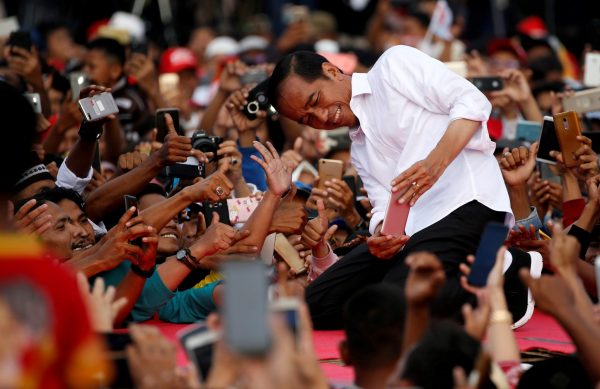Indonesia’s controversial Information and Electronic Transactions Act (UU ITE) is becoming the country’s de facto ‘anti-fake news’ law, similar to those proposed or in existence in other countries in the region.
Prior to the election period between September 2018 and April 2019, SAFENET documented 22 cases of charges under UU ITE. The Ministry of Communications implemented a 24 hour ‘war room’ using artificial intelligence to combat hoax material in addition to the police and reports to authorities made by individual citizens, political and volunteer groups and NGOs.
There were at least 19 arrests of people accused of creating or distributing hoax news reported in the Indonesian media during this time, many of which were made under UU ITE. Such arrests occurred primarily in Java but extended all over the country to include Aceh, Lombok, Riau, Sulawesi and Kalimantan.
In September 2018, five people in Sidoarjo in East Java were arrested for sharing fake news about a student protest at the Constitution Court in Jakarta. In November, police arrested an Acehnese man as the alleged administrator of the Instagram account ‘Suara Rakyat’ that was accused of spreading material stating that Jokowi was a communist. On 26 December 2018, an arrest was made in Aceh of the editor of a video which had Jokowi’s running mate, Ma’ruf Amin, dressed as Santa Claus. He was later sentenced to a seven-month prison term.
In February 2019, three women in Karawang in West Java were arrested and subsequently jailed for six months for creating the hoax news that if Jokowi were to be elected, there would be no more azan (call to prayer). The interesting aspect of this case was that the women were arrested for essentially conducting a door-to-door campaign — they were all members of a volunteer group supporting Prabowo Subianto for president, PEPES (Partai Emak-Emak Pendukung Prabowo-Sandi) — although their case went ‘viral’ due to video footage of them distributing this material.
The most publicised case of hoax news throughout the election was that concerning Ratna Sarumpaet, a former campaign team member of the losing pair Prabowo–Sandiaga’s team who claimed to have been assaulted by a group of men for her involvement in the opposition campaign. She later confessed that the swelling was the result of cosmetic surgery. She was eventually sentenced to a two-year jail term for spreading misinformation and causing public disorder under Article 14 (1) of the Criminal Code, as well as hate speech under Article 45A (2) of the UU ITE.
The pattern here is clear. The arrests were all for creating or distributing hoax material which discredited or slandered President Jokowi. Indeed, some citizens arrested were even identified as Prabowo supporters. This is not to say that the above arrests were illegitimate. Rather, it is to highlight how arrests are prioritised and to point out that there is seemingly no evidence of any police arrests of citizens who share fake news about Prabowo Subianto or Sandiaga Uno, nor of citizens who were creating hoax material to help Jokowi win the election.
It was likely that there were more cases of hoax news against President Jokowi than against any other Indonesian political figure. For example, Mafindo, a Jakarta-based organisation set up to counter hoax news, reported in 2018 that 28.98 per cent of hoax material was directed against President Jokowi and 20.85 per cent against Prabowo. But there is a clear indication that hoax news was created by both sets of supporters throughout the election campaign.
For example, a well-known case of slander during the election campaign was ‘Sandi-leaks’ material depicting Sandiaga as a philanderer. The government took down the scandalous site but no one has been arrested in relation to this case. In late January, Prabowo’s team reported the tabloid Indonesia Barokah to police for spreading hoax material. They claimed to have already reported 20 cases of defamation and hoax material creation which was designed to undermine their campaign. No arrests have been made.
The current system favours arrests of those who attack the sitting President. While the President is no doubt a major subject of political hoaxes, the structures within the police that require reporting directly to the President — and the police force’s close relationship to The Ministry of Communications and Information — leads to a more partisan operation. This system creates the potential for arrests that are politically motivated and based largely on whether the content is anti-government, leading to a perception that the government does not tolerate criticism and is using the security forces as an instrument of political repression.
Ross Tapsell is a Senior Lecturer at the College of Asia and the Pacific, Australian National University and a visiting fellow at the ISEAS-Yusof Ishak Institute, Singapore. A longer version of this piece can be found here.

